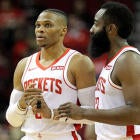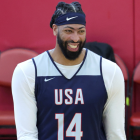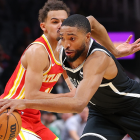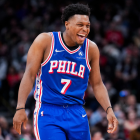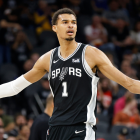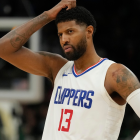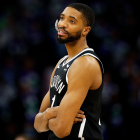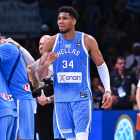The Houston Rockets are, to put it charitably, built around an idea. More realistically, they are built around a fantasy. On paper, the pairing of James Harden and Russell Westbrook probably shouldn't work. Yes, the two played alongside one another with the Oklahoma City Thunder, but their last game together was so long ago that only two of the 12 players who suited up for the Miami Heat that night—LeBron James and Udonis Haslem—are still on NBA rosters. It was a different lifetime. Harden and Westbrook have separately become two of the highest usage players in NBA history. As rarely as this statement applies, there really is only one basketball.
But the Rockets fundamentally believe in the power of talent, often to the detriment of almost everything else. As ill-fitting as they may appear, Houston has two former MVPs on its roster. No other team can say the same, and that makes them one of the most fascinating stories of the season.
Virtually every prediction one could make about this team would be bold because nobody has any idea what this is going to look like. These five should paint a relatively clear picture of what sort of season the Rockets can expect, but be warned: everything written in this space could be obsolete a week into the season.
1. Russell Westbrook will have a career-year behind the arc
Westbrook is a notoriously poor 3-point shooter. He isn't exactly great at any specific type of long-range shot, but his numbers on catch-and-shoot attempts are typically far better than his overall percentage. The table below represents the last five years of Westbrook's career:
Overall Percentage | Catch-and-Shoot Percentage | |
2018-19 | 29.0 | 31.9 |
2017-18 | 29.8 | 34.2 |
2016-17 | 34.3 | 34.8 |
2015-16 | 29.6 | 33.3 |
2014-15 | 29.9 | 38.7 |
The difference between abysmal and slightly-below league-average is meaningful, and Oklahoma City's spacing was generally fairly poor during that stretch. Houston's dominance behind the arc is overstated and comes down to volume far more than proficiency, but this should still be one of the best shooting teams Westbrook has ever played on. He'll get plenty of open looks.
In all likelihood, those will be catch-and-shoot looks. For all of the Twittersphere's dreams of Westbrook using his new alliance with Harden to become the dominant cutter he could be, Mike D'Antoni described his planned off-ball role to Rob Mahoney of Sports Illustrated by saying "he'll be standing a lot." The Rockets want to turn Westbrook into a shooter when Harden has the ball.
That plan is almost certainly suboptimal, but the bar is very low here. Westbrook has never topped 34.3 percent from behind the arc over a full season. He'll either approach or top that number, and Houston's perpetual green light should push his volume beyond his career-high of 7.2 attempts per game. Even if he doesn't technically shoot his best percentage on 3-pointers, Westbrook will have his most valuable shooting season ever as a Rocket.
2. But the Rockets will shoot fewer 3-pointers than they did in the previous season for the first time since 2015-16
Westbrook may thrive behind the arc, but Houston's overall shot-profile is about to change. Westbrook isn't the primary culprit here. He may bring an unhealthy amount of mid-range shots to the offense, but Chris Paul did as well. The real question here is whether or not the Rockets have hit the upper limits of what is possible on an NBA court, and what their own roster can sustain. Most evidence suggests that they have.
Houston attempted 45.4 3-pointers per game last season, over seven more than any other team in basketball. Leading the NBA in attempts is old hat for the Rockets. They do it almost every year. But eventually, a point is going to come in which boundary-pushing for its own sake will lose utility.
After all, the Rockets were roughly a league-average team in terms of actual 3-point percentage. At 35.6 percent, they finished 12th in the NBA. They weren't much better at the rim, finishing 14th by making 67 percent of their attempts within three feet of the basket. Believe it or not, they thrived in the area that they avoid like the plague: the mid-range. Only Golden State made a better percentage of their 2-pointers longer than 16 feet, and Kevin Durant stacks the deck.
This is by no means a suggestion that Houston will, or should, suddenly start imitating the San Antonio Spurs offensively, but it indicates that teams are hardly defending Houston in that part of the court. Teams grow more comfortable defending well-spaced courts every year. With an offseason of film study under their belts, defenses will almost certainly have new tactics for Harden's stepbacks. Westbrook's presence will cost him attempts.
At that point, it becomes simple math. The Rockets lost 441 3-point attempts when Gerald Green broke his foot, 355 when Paul got traded, and are likely to see some decline from Harden as well. Replacing 1,000 or so attempts without adding any dependable shooters would be borderline irresponsible. Houston's roster dictates a shred of balance in its shot selection. The Rockets will probably still lead the league, but for the first time since Mike D'Antoni took over as coach, they will attempt fewer long-range shots than they did in the previous season.
3. The Rockets will have a bottom-10 defense
D'Antoni said on media day that the Rockets would have a top-five defense. That will not happen. Only one D'Antoni-coached team has ever finished with a top-five defense. That was the 2011-12 New York Knicks, who fired him midway through the season. They were ranked No. 10 when he was let go, and finished No. 5 thanks in large part to his replacement, Mike Woodson.
In truth, the Rockets have been due for some regression for two years now. During the 2017-18 campaign that nearly ended in a championship, the Rockets allowed opponents to shoot only 35.1 percent on 3-point attempts. That was the seventh-lowest mark in basketball and one that typically isn't sustainable. Opponent's 3-point percentage is largely random on a year-to-year basis, but last year, Rockets opponents made only 34 percent of their attempts. That was the second-lowest mark in the NBA.
If the Rockets do regress, they don't have much else to fall back on. Houston was the worst rim-protecting team in basketball last season, allowing opponents to make 70 percent of their attempts within three feet of the hoop. They committed 1,803 personal fouls, sixth-most in basketball. Even their scheme is in flux. Defensive coordinator Jeff Bzdelik, largely credited with implementing the switching scheme that gave the Warriors fits in the 2018 Western Conference finals, was let go by the front office this offseason.
That says nothing of the roster turmoil this team will face defensively. Westbrook is a significant downgrade from Paul. Backup center is going to be a major problem area, as Tyson Chandler's age will make it difficult for him to play consistently, and Nene's contract will likely keep him off of the court most of the time as well (more on that later). P.J. Tucker has been an All-Defense-caliber player since joining the Rockets, but he is now 34-years-old. Some decline is inevitable for him, and for the team. That decline is coming from a No. 17 finish last season. There is more than enough to worry about here to justify a bottom-10 finish.
4. They'll make up for it by rebounding at a league-average rate... and feasting in transition
Houston's biggest defensive flaw last season was actually ending possessions. The Rockets had the NBA's third-lowest rebounding rate at 48.1 percent last season. Paul is a 6-foot-1 traditionalist whose rebounding could best be described as "plucky." Westbrook is inarguably the greatest rebounding guard since Oscar Robertson, if not ever. That swap alone is going to make an enormous difference for the Rockets.
It is also where they will make up the bulk of their defensive losses. Houston has been one of the most efficient transition offenses in basketball over the past few seasons. Their 1.15 points per possession in transition last season ranked third in basketball. The trouble comes in volume. The Rockets had the fourth-slowest pace in basketball last season and were stuck in the middle of the pack in terms of overall transition possessions.
Westbrook is going to change that. His Thunder teams finished eighth or higher in transition possessions in every season that the stat has been tracked, and it's not as if Andre Roberson is leading the break. Westbrook is a transition offense unto himself, and the easy points he is going to create in transition will help offset whatever difficulties come with integrating him into the defense and half-court offense. Houston's path to contention relies on being one of the NBA's best transition offenses, and merely having Westbrook is a great start.
5. Houston will avoid the luxury tax yet again
This prediction is more pointed than bold, but it might be the difference between a championship and a bust for the Rockets. Last season, Daryl Morey had to work aggressively to get the Rockets under the luxury tax line at the trade deadline. That was why he traded Carmelo Anthony rather than just releasing him, and it was what motivated the trade of James Ennis, a useful wing, to the Philadelphia 76ers. Morey spent a first-round pick offloading the salary of Brandon Knight, yet in an interview with Jonathan Feigen of The Houston Chronicle, Rockets owner Tilman Fertitta called Houston's ducking of the luxury tax "a fluke."
Fertitta has consistently claimed that he is willing to pay the tax. Last season provided damning evidence to the contrary. Fertitta funded his $2.2 billion purchase of the Rockets primarily by selling $1.4 billion worth of bonds in his casino and restaurant businesses, and according to Mike Ozanian of Forbes, he and his businesses had less than $300 million in cash at the time of the sale. Most NBA teams can afford to break even or even lose money due to the wealth of their owners. With this much debt, the same likely isn't true for Fertitta, who is also reckoning with lost revenue in China stemming from Daryl Morey's comments about the Hong Kong protests.
Fertitta's exact words prior to last season stated that he bought the team "to win championships" and that he was "not going to let five or 10 or 15 or 20 million dollars make the difference." Well, that position is about to be tested.
As it stands right now, the Rockets are just below the tax line. Improving this team in any meaningful way would mean jumping above it. Replacing the injured Gerald Green with a free agent, for instance, would come at a financial cost unless Houston was willing to wait until Dec. 15 to trade him and open up a roster spot. Adding any salary in a mid-season trade would push them above the tax line as well.
The bellwether here is going to be Nene. He is currently on the books for only the veteran's minimum, but he is eligible for $7.4 million in bonuses tied to Houston's record and the total number of games he plays. Assuming the Rockets win more than last season's 52 games, Nene would only need to step on the court in 10 total games in order to receive his first bonus and push the Rockets above the tax line.
Houston is going to need Nene at some point. If they play him, it is a sign that they are willing to pay the tax and do what it takes to build a championship roster. If they don't, when combined with their previous moves, the message is clear: the Rockets will not pay the tax. The smart bet is on the former. Don't expect the Rockets to spend to improve during the season, and if that is what costs them a championship, then so be it.









